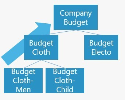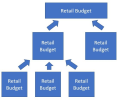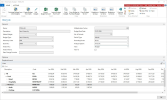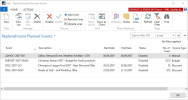


The Budgets and Open-to-Buy section covers the elements used in Replenishment for planning and how they are set up.
Scope:
- Sales Budgets and to plan future sales and compare with actual values
- Purchase Budgets to plan future purchases and compare with actual values
- Open-to-Buy to compare Sales and Purchase Budgets with actual purchase values to calculate outstanding purchases (to achieve the sales goals).
Goal
The goals of this step:
- Get a detailed understanding of the retailer's planning process
- Create a planning structure
- Set up budgets and Open-to-Buy
Key questions / considerations
Budgets
- Are budgets used to plan future sales and purchases?
- What is the lowest budgeting level (item specific)?
- Division
- Item Category
- Product Group
- Item
- Are budgets maintained company wide or on store level?
- What is the budget period level?
- Month
- Week
- Day
- Are multiple budgets maintained in parallel?
- Different Divisions, Item Categories or Product Groups?
- Different stores?
- Are budgets consolidated into master budgets?
- Are budgets broken down (to item, day, store) to be used for Replenishment Planned Demand Events?
Open-to-Buy
- Is Open-to-Buy used for purchase planning?
Output
LS Central setup considerations
Budgets:
You can find details about how to set up budgets here:
Planned Demand Events
Budgets can be used to drive Automatic Replenishment calculation via Planned Demand Events. The Planned Demand Event will change or overwrite the forecast quantity from the Replen. Calculation Method type Average Usage.
For more information on how to set up Planned Demand Events with budgets see Replen. Planned Sales Demand.
To enable a budget to be used with Planned Demand Events, the budget has to be on day level, for stores and items. Budgets can be broken down from higher levels to this level.
For details on how to break down a budget see How to: Break Down and Consolidate a Sales Budget.
Go back to:





